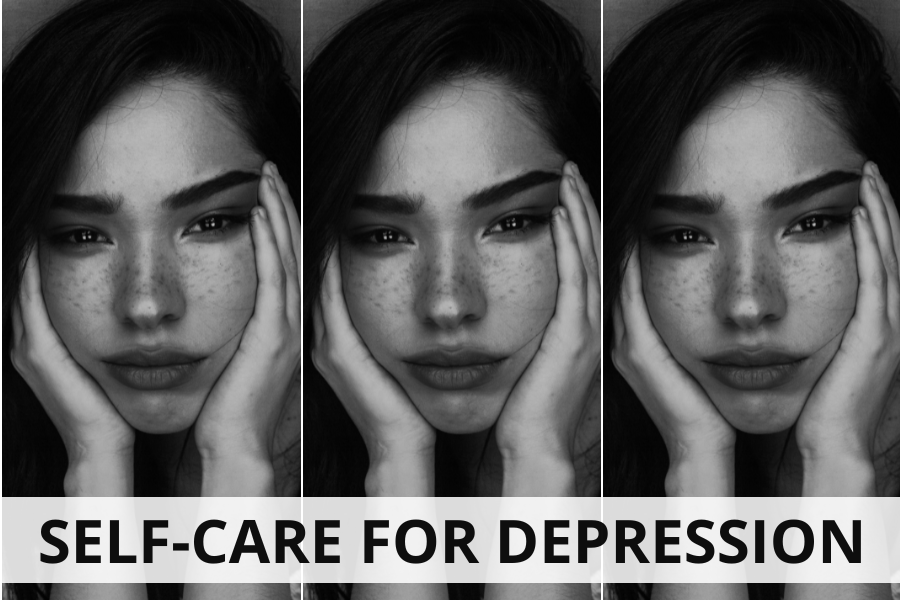This post is about self-care for depression.
This post may contain affiliate links, which means I’ll receive a commission if you purchase through my link at no extra cost. Please read the full disclosure here.

Depression is a common mental health disorder that affects millions of people worldwide. It can significantly impact a person’s overall well-being and quality of life.
In this blog post, I will explore the importance of self-care for depression, including its causes, symptoms, and treatment options.
This post is about self-care for depression.
Self-Care For Depression.
1. Causes of Depression

Many things, like genes, chemicals in the brain, and the environment around us, can cause depression. Some things that make depression more likely are called risk factors. Here are some common ones:
- Family history of depression
- History of traumatic or stressful life events
- Chronic illness or pain
- Substance abuse or addiction
- Imbalance in brain chemicals such as serotonin and dopamine
Research suggests that depression doesn’t spring from simply having too much or too little of certain brain chemicals. Rather, there are many possible causes of depression, including faulty mood regulation by the brain, genetic vulnerability, and stressful life events.
harvard health publishing
2. Symptoms of Depression

Depression is a crippling condition that can manifest in countless ways, some of which may come as a shock.
It’s heartbreaking to think that some people may suffer from high-functioning depression, masking their symptoms so well that they go unnoticed by those around them. They may seem to be thriving at work, but when they return home, they struggle to function, barely muster the energy to leave their bed.
It’s a painful reality that, as a colleague or loved one, you may not even realise they are battling depression. But don’t lose hope! Depression has a range of symptoms you can look out for, giving you a chance to be there for the ones you love and encouraging them to seek help.
Symptoms of depression can vary from person to person, but some common signs include the following:
- Persistent feelings of sadness, hopelessness, or worthlessness
- Loss of interest in activities once enjoyed
- Changes in appetite or weight
- Insomnia or excessive sleeping
- Fatigue or low energy
- Difficulty concentrating or making decisions
- Thoughts of self-harm or suicide
Remember, just because you have some of these symptoms doesn’t mean you have depression. But if you have had several of these symptoms for a long time, talking to a mental health professional might be helpful.
Related Post: Love Hurting Your Heart? 5 Reasons Why & How to Avoid the Pain
3. Treatment for Depression

Depression is a problem that many people face, but it can be treated.
If you are feeling depressed, it’s good to know that there are things you can do to feel better. Getting help for depression is brave and can make a big difference in your life.
The Black Dog Institute states, ‘Depression can sometimes go away by itself. But left untreated, it may last for many months or get significantly worse. Always seek help early, so you can recover sooner.’ (https://www.blackdoginstitute.org.au)
Some common treatments for depression include:
- Medication: Antidepressant medications can help regulate brain chemicals and improve mood.
- Therapy: Talk therapy, such as cognitive-behavioural therapy (CBT), can help individuals identify negative thought patterns and develop coping skills.
- Lifestyle changes: Incorporating self-care activities like exercise and mindfulness practices into daily routines can help improve symptoms.
- Alternative therapies: Some individuals may find relief through alternative therapies, such as acupuncture or massage therapy.
Related Post: 11 Simple Habits: Setting Up Your Work Day for Mental Health Success
4. Practical Tips and Advice for Managing Depression

Managing depression takes time and effort, but there are practical steps you can take to improve your symptoms and overall well-being.
Consider incorporating self-care activities into your daily routine, such as taking a warm bath or practising yoga. I love to take a bath with Epsom salt, light a candle and have a nice glass of wine with my favourite playlist in the background. It just takes me away to a different place where I can escape the chaos of the world for a few moments.
Getting enough sleep, exercising regularly, and eating a healthy diet can also help improve symptoms. Staying connected with others and practising mindfulness can also be beneficial. And most importantly, if you’re experiencing symptoms of depression, it’s important to seek help from a mental health professional.
With the right treatment and support, it is possible to manage depression and improve your quality of life.
Final Thoughts

Depression is a serious mental health problem that can make life very difficult. But there are ways to feel better with the right help and treatment.
If you or someone you know is feeling sad or hopeless, don’t be afraid to ask for help from a mental health expert. With the right care and support, you can feel happier and enjoy your life again.

